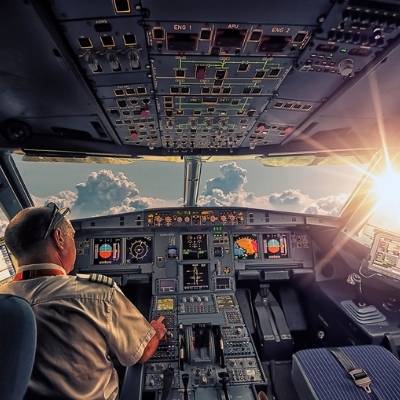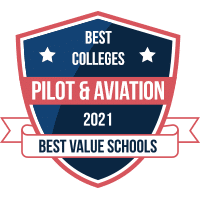
Pilot schools, flight training, and aviation education offer various specializations leading to different career outcomes. An aviation degree with a flight emphasis or enrollment in a specific pilot school enables students to legally operate aircraft. Over the next 20 years, the airline industry anticipates a shortage of qualified pilots and mechanics. To address this, airlines are partnering with affordable colleges to bolster flight programs by offering pathway programs.
These pathway programs provide scholarships and guaranteed employment upon graduation, making it more accessible for students to remain in aviation programs and complete the necessary flight hours for certification. Graduates with a bachelor’s degree in aviation need only 1,000 flight hours to qualify for commercial flying, compared to 1,500 hours for those without such a degree. Associate degree holders require 1,250 hours. Many pilots also build flight hours by becoming flight instructors.
With more airlines partnering with colleges to support student success and employment, now is an ideal time to pursue a career in aviation.
The Best Pilot Schools
Purdue School of Aviation and Technology
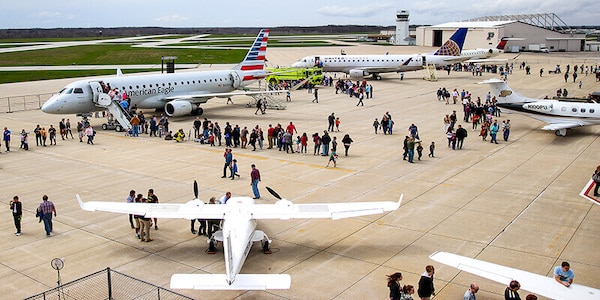
Purdue School of Aviation and Technology
Purdue University’s School of Aviation and Technology offers a top-ranked, fully accredited professional flight program. Students benefit from:
- State-of-the-art flight simulators for extensive practice
- Comprehensive bachelor’s degree curriculum covering:
- Broad aviation industry knowledge
- Aviation’s role in transportation systems
- Related technical fields
The program prepares graduates for careers as commercial, corporate, or charter pilots, emphasizing analytical skills and critical thinking in the cockpit.
Programs:
- Undergraduate
- Aeronautical Engineering Technology
- Aviation Management
- Professional Flight
- Unmanned Aerial Systems
- Graduate
- Aviation Financial Management Graduate Certificate
- Aviation Financial Management Graduate Certificate (Online)
- Aviation Safety Management Graduate Certificate
- Aviation Safety Management Graduate Certificate (Online)
- MS in Aviation and Aerospace Management
- MS in Aviation and Aerospace Management (Online)
- Ph.D. in Aviation Technology and Management
- Ph.D. in Technology
Unique Value: Purdue’s aviation program is part of a larger research university, providing students access to cutting-edge aerospace technology and interdisciplinary learning opportunities. The school also offers a combined BS-MS degree program that enables students to complete their bachelor’s and master’s degrees in a total of five years.
School Overview
University of North Dakota Department of Aviation
University of North Dakota Department of Aviation
The University of North Dakota (UND) lays claim to be the world’s most comprehensive aerospace university, offering a unique blend of liberal arts education and professional aviation training.
- The John D. Odegard School of Aerospace Sciences provides students with a wide array of aviation specialties, including top-ranked programs in aviation management and commercial aviation.
- As the second-largest degree-granting school at UND, the department is internationally recognized for its excellence in aviation education, aerospace research, and space studies.
Programs:
- Undergraduate
- Air Traffic Management (B.S.)
- Aviation Management (B.B.A.)
- Aviation Safety & Operations (B.S.)
- Aviation Studies (B.S.)
- Commercial Aviation (B.S.)
- Unmanned Aircraft Systems Operations (B.S.)
- Graduate
- Aviation (M.S.)
- Aerospace Sciences (Ph.D.)
Unique Value: UND stands out for its robust research initiatives and global influence in aerospace and aviation, offering students unparalleled opportunities to engage in cutting-edge research and policy studies.
School Overview
Embry – Riddle Aeronautical University
Embry-Riddle Aeronautical University
As a pioneer in aviation education, Embry-Riddle Aeronautical University is one of the most prestigious institutions dedicated to the study of flight. Known as the oldest and most comprehensive aeronautical university, Embry-Riddle offers students access to cutting-edge research, national and international aviation policies, and the latest advancements in the field. The university is actively involved in shaping aviation research and policymaking, ensuring that students receive the most relevant and current education available.
- Other Campuses: Prescott, Arizona; Worldwide Online Campus
Programs: Embry-Riddle offers a broad range of programs, including certificates; associate, bachelor’s, master’s, and doctoral degrees; and non-degree programs.
- Flexible Learning: Students can choose from traditional on-campus programs, online courses, or hybrid methods tailored to accommodate working professionals and military personnel.
- Global Influence: Embry-Riddle’s extensive involvement in global aviation research and policy positions its graduates at the forefront of the industry.
Unique Value: Embry-Riddle’s unmatched legacy in aviation education, combined with its flexible learning options and global reach, offers students a distinctive edge in the ever-evolving field of aviation.
School Overview
Lewis University
Lewis University Department of Aviation & Transportation
Lewis University offers aviation students unparalleled access to industry opportunities, thanks to its proximity to major aviation hubs, including the headquarters of United Airlines and Boeing Corporation, and one of the world’s busiest airports, O’Hare International. The university’s location alone provides students with unique, hands-on experiences that are hard to match elsewhere.
Program Highlights:
- Immersive Industry Experience: Students are deeply integrated into the aviation industry, with O’Hare International Airport and a regional airport located directly on campus.
- Premier Resources: The program features top-tier flight instruction, an extensive aircraft fleet, and numerous networking opportunities.
- Strong Job Placement: Many students are recruited by leading aviation companies even before they graduate.
- Location: near Chicago
Unique Value: Lewis University’s aviation program offers students direct access to one of the most significant aviation networks in the country, enhancing their career prospects through real-world industry immersion and early recruitment opportunities.
School Overview
Ohio State University’s Center for Aviation Studies
Ohio State University’s Center for Aviation Studies
Ohio State University, founded in 1870, has a long history in aviation education, beginning with pilot training during World War I. After a brief hiatus, the program resumed to support the World War II effort and has since evolved into a comprehensive aviation program. Today, Ohio State operates the third busiest airport in Ohio, where students log over 7,000 training hours annually.
Program Highlights:
- Historical Significance: Ohio State’s aviation program has been a cornerstone of pilot training since World War I, with a deep-rooted legacy in supporting national aviation needs.
- Extensive Flight Training: Students benefit from access to one of the busiest airports in the state, providing ample real-world flight experience.
- Accreditation: The Center for Aviation Studies is fully accredited by the Aviation Accreditation Board International (AABI), ensuring high educational standards.
Unique Value: Ohio State University’s Center for Aviation Studies combines a rich historical legacy with modern training facilities, offering students a unique blend of tradition and cutting-edge aviation education.
School Overview
Western Michigan University
Western Michigan University College of Aviation
With over 80 years of experience in pilot training, Western Michigan University (WMU) is committed to maintaining one of the most advanced training fleets and comprehensive aviation programs globally. WMU graduates are academically prepared with essential communication skills, critical thinking abilities, and a strong ethical foundation, leading to an impressive 97% job placement rate in their chosen fields (100% placement in flight and tech ops) for the 2018-19 academic year—one of the highest in the nation.
Program Highlights:
- Extensive Training Fleet: WMU boasts 50 aircraft, providing students with ample flight hours and the ability to earn certifications more quickly after graduation.
- Diverse Degree Options: The university offers three specialized aviation degrees:
- Aviation Flight Science: A professional pilot program
- Aviation Management and Operations: Focusing on the business side of aviation
- Aviation Technical Operations: Qualifying graduates for airframe and powerplant certification
- Industry Partnerships: WMU is one of only three programs in the country partnered with both the Delta Propel and United Aviate programs. Additionally, WMU maintains partnerships with a number of airlines, providing students with strong hiring opportunities.
Unique Value: WMU’s unparalleled job placement rates, extensive partnerships with major airlines, and commitment to cutting-edge training make it a leader in collegiate aviation education, preparing students for successful careers in the industry.
School Overview
The United States Air Force Academy
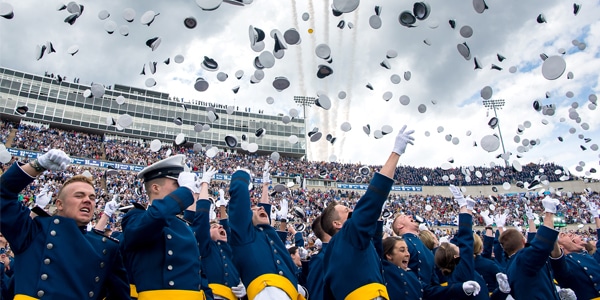
United States Air Force Academy
The United States Air Force Academy (USAFA) is renowned for its history of excellence and its commitment to preparing cadets for leadership roles in the 21st century. As both a public university and a military service academy, USAFA is at the forefront of advancements in air, space, and cyberspace, among many other critical fields.
Program Highlights:
- Holistic Education: Cadets receive a world-class education combined with rigorous military training, extensive undergraduate research opportunities, Division I athletics, and character-building challenges.
- Airmanship Programs: A core component of the USAFA experience is the Airmanship Programs, where cadets engage in hands-on learning through soaring, powered flight, and parachuting courses. These programs provide invaluable experience in flight, navigation, and operations, offering cadets unique opportunities to master aviation principles in real-world scenarios.
Unique Value: The USAFA offers a unique blend of academic excellence, military training, and real-world aviation experience, setting it apart as a premier institution for those committed to serving their country and leading in the ever-evolving fields of air, space, and cyberspace.
School Overview
Baylor University
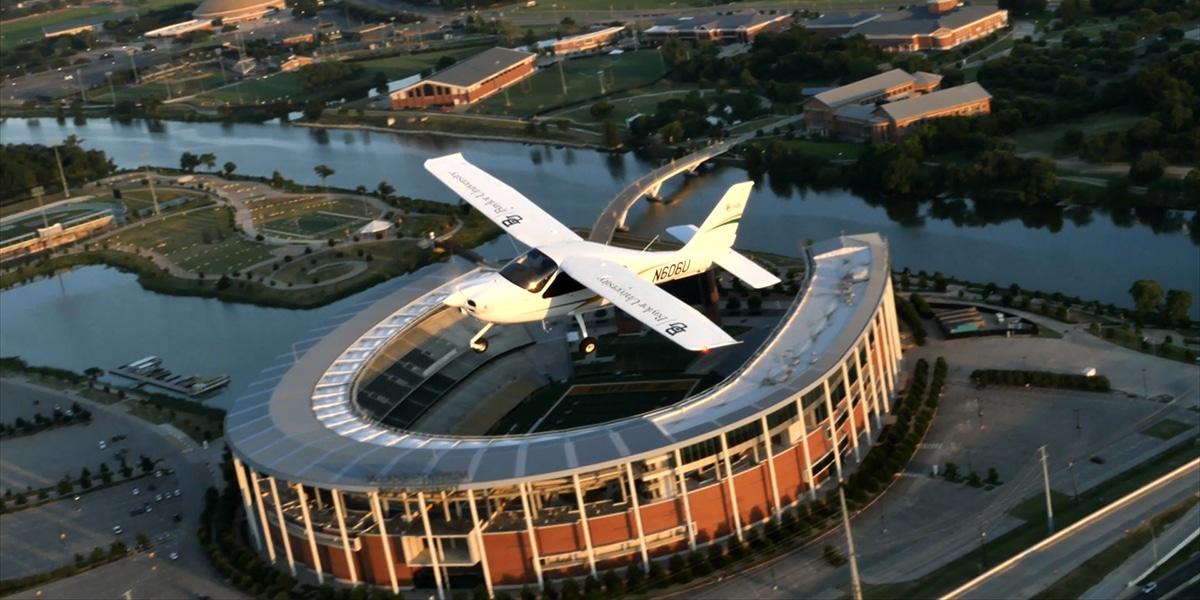
Baylor University Aviation Sciences Program
Baylor University offers a unique blend of vibrant campus life and a faith-based community, making it an ideal choice for students pursuing a career in the aviation industry. As a Big 12 university, Baylor provides an outstanding education while fostering a close-knit environment that supports both academic and spiritual growth.
Program Highlights:
- Aviation Sciences Major: The program offers a Professional Pilot concentration with options in both Airplane and Helicopter tracks, allowing students to gain valuable flight experience as part of their degree.
- Comprehensive Training: Graduates complete all necessary certifications and ratings, preparing them for successful careers as airline or corporate pilots.
- Industry Connections: Students benefit from exposure to passionate industry professionals and opportunities to build a strong network in the aviation field.
Unique Value: Baylor’s Aviation Sciences program combines top-tier flight training with a supportive, faith-based community, offering students a well-rounded education that prepares them for both professional success and personal fulfillment.
School Overview
Utah Valley University
Utah Valley University School of Aviation Sciences
Utah Valley University (UVU) provides a flexible and comprehensive professional pilot degree, available both on-campus and online. This flexibility allows students to tailor their education to their needs, whether they complete their flight hours at a nearby FAA-approved airport or at any FAA-approved flight school nationwide.
Program Highlights:
- Flexible Learning Options: UVU offers both on-campus and online professional pilot degrees, accommodating students who need to balance their studies with other commitments.
- Pathway Programs: Through partnerships with numerous airlines, UVU provides students with clear career pathways, offering guidance and support throughout their education and after graduation.
- Community and Networking: Students benefit from active participation in aviation clubs, which provide additional opportunities for networking and professional growth.
Unique Value: UVU’s combination of flexible learning options, strong airline partnerships, and a supportive aviation community equips students with the skills, experience, and connections necessary to succeed in the aviation industry.
School Overview
Saint Louis University
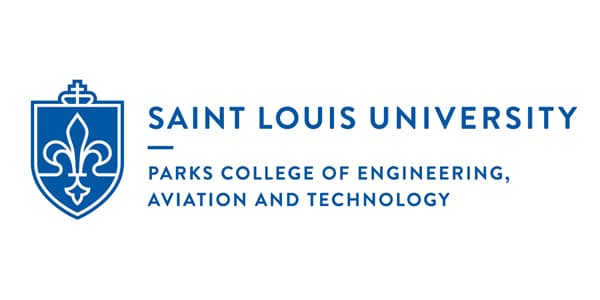
Saint Louis University’s Parks College of Engineering, Aviation and Technology
As America’s first federally certified school of aviation, Saint Louis University’s Parks College of Engineering, Aviation and Technology has been a trailblazer in the aviation industry. With a strong emphasis on innovation, Parks College has led advancements from robots to rockets, making significant contributions to engineering and technology.
Program Highlights:
- Early Flight Experience: Students in the flight program begin logging flight hours as early as their freshman year, steadily building experience throughout their bachelor’s degree program.
- Innovative Education: Parks College integrates cutting-edge technology and engineering into its curriculum, ensuring students are well-prepared for the future of aviation.
- Jesuit Values: The college maintains a student-focused approach, guiding students to successful careers while upholding the Jesuit values of Saint Louis University.
Unique Value: Parks College offers a unique combination of early hands-on flight experience, innovative technology, and a values-driven education, setting students on a path to success in the aviation industry.
School Overview
LeTourneau University
LeTourneau University College of Aviation and Aeronautical Science
LeTourneau University is unique in Texas as the only institution awarding aviation degrees at both the undergraduate and graduate levels. What sets LeTourneau apart is its commitment to delivering all aviation education through expert faculty members, from classroom instruction to flight training and aircraft maintenance—ensuring a consistent, high-quality educational experience without reliance on third-party providers.
Program Highlights:
- Expert-Led Education: All aviation courses, including flight instruction and aircraft maintenance, are taught by LeTourneau’s own faculty, ensuring students receive a cohesive and comprehensive education.
- Impressive Job Placement: Graduates of the aviation program boast a 97% three-year job placement rate, reflecting the program’s effectiveness in preparing students for the aviation industry.
- State-of-the-Art Facilities: LeTourneau’s training facilities, including advanced flight simulators, provide students with exceptional hands-on experience, equipping them with the skills needed for successful careers.
Unique Value: LeTourneau University’s all-faculty-led aviation program, combined with its outstanding job placement record and cutting-edge training facilities, offers students a premier aviation education that is both comprehensive and career-focused.
School Overview
Louisiana Tech University
Louisiana Tech University Department of Professional Aviation
Since 1967, Louisiana Tech University has been home to an outstanding aviation program that produces professional pilots and aviation specialists. The Department of Professional Aviation is fully accredited by the Aviation Accreditation Board International (AABI) and is a proud member of the University Aviation Association, ensuring the highest standards in aviation education.
Program Highlights:
- Accredited Excellence: The program’s AABI accreditation underscores its commitment to quality education and industry standards.
- Strategic Partnerships: Louisiana Tech offers valuable partnerships with major air carriers and regional airlines, providing students with opportunities to participate in internships and gain real-world experience.
- Comprehensive Training: Graduates leave the program equipped with the knowledge, skills, and attitude necessary to succeed as leaders in the aviation industry.
Unique Value: Louisiana Tech University’s strong industry connections and rigorous, accredited aviation program provide students with both the education and practical experience needed to excel in their aviation careers.
School Overview
Methodology
If you are looking to take to the skies, quite literally, with your education, browse the Pilot schools and aeronautics programs that are available around the country and enroll in the best program for you. As the demand for highly trained and qualified pilots is set to increase over the next decade, now is the time to enroll in pilot school to have a high paying and rewarding career tomorrow.
Schools were ranked according to a matrix of cost, job placement upon graduation, opportunities for flight hours, and partnerships with pathway programs. School overview information is from College Scorecard.
Is a Pilot School Right for You?
Deciding if a pilot school or aviation college is the right choice involves several key considerations. Prospective students should assess their interest and aptitude in aviation, understanding that this field requires a strong foundation in science, mathematics, and technology. It’s also important to consider the physical and mental demands of a career in aviation, including the ability to handle high-pressure situations and irregular work hours.
Financial investment is another crucial factor. Pilot training and aviation programs can be costly, so understanding the financial commitment and exploring potential financial aid is important.
Future career aspirations play a pivotal role in this decision. While many aspire to become commercial pilots, aviation careers are diverse, including roles in air traffic control, aircraft maintenance, and aerospace engineering.
Lastly, consider the lifestyle implications, such as the possibility of frequent travel and time away from home, which are inherent to many aviation careers. Balancing these factors with personal goals and interests is key to determining if an aviation-focused education is the right path.
Do I Need Flying Experience Before Attending Flying School?
It’s a common question whether prior flying experience is necessary before enrolling in a flying school. The answer largely depends on the specific requirements of the school and the program. Generally, no prior flying experience is required for entry-level pilot training programs. These schools are designed to teach you everything from the basics. However, having some experience can be beneficial and might make the learning process smoother. It’s always a good idea to check with the specific school for any prerequisites or recommended experience before applying.
Do I Need to Graduate from a Pilot School in Order to Become a Pilot?
While attending a pilot school can provide structured training and comprehensive education, it’s not the only path to becoming a pilot. The Federal Aviation Administration (FAA) does not require pilots to graduate from a specific pilot school program. There are alternative routes to obtaining a pilot’s license, each with its own advantages and considerations:
- Part 61 vs. Part 141 Training: These refer to different sections of the Federal Aviation Regulations (FARs) that govern pilot training:
- Part 61 Training:
- Offers a flexible, personalized approach to flight training
- Not required to follow a specific syllabus
- Students can train at their own pace
- Typically conducted at smaller flight schools or with independent instructors
- May require more flight hours to qualify for certain certificates
- Can be more cost-effective for those who can’t commit to a full-time program
- Part 141 Training:
- Follows a structured, FAA-approved curriculum
- Typically offered by larger flight schools and aviation universities
- More intensive, often full-time programs
- May allow students to qualify for certificates with fewer flight hours
- Rigorous oversight and reporting to the FAA
- Often preferred by airlines and may offer better career connections
- Military Training:
- Many commercial pilots begin their careers in the military, receiving extensive training and flight experience.
- Individual Instruction:
- You can earn your license by working with individual Certified Flight Instructors (CFIs) at local airports.
- University Degree Programs:
- Some universities offer aviation degrees that include flight training, combining academic education with practical skills.
- Aviation Academies:
- Dedicated flight academies offer intensive training programs, often with connections to airlines.
The choice between these options depends on factors such as your career goals, budget, schedule flexibility, and learning style. While pilot schools offer structured programs and potentially quicker paths to certain certificates, motivated individuals can become pilots through various means.
It’s important to note that regardless of the path chosen, all pilots must meet the same FAA requirements for flight hours, medical certification, and written and practical exams to obtain their licenses. The key is to choose the method that best aligns with your personal circumstances and professional aspirations.
Prerequisites for Pilot Schools in the USA
Enrolling in a pilot school in the United States typically involves meeting certain prerequisites. These usually include:
- Age Requirements: Minimum age limits apply, often 17 years for private pilot training and 18 for commercial pilot training.
- Educational Background: A high school diploma or equivalent is generally required, with a focus on subjects like mathematics and physics.
- Medical Certification: Obtaining an FAA medical certificate is crucial to ensure you meet the health and fitness standards for flying.
- English Proficiency: As English is the international language of aviation, proficiency is necessary for both domestic and international communication.
- Background Checks: For security reasons, background checks are standard procedure in aviation training.
These prerequisites ensure that students are prepared for the rigors and responsibilities of pilot training.
How Long Is Pilot School?
Pilot school is a lengthy program that can take up to two years, depending on the type of license an aspiring pilot is seeking. Fully-fledged aeronautics degrees (undergraduate) can take up to four years. For a commercial pilot license, the process typically involves obtaining at least 250 hours of flight time and requires knowledge in areas such as aircraft performance, instrument training, navigation systems, aviation weather systems, and more.
To receive an Airline Transport Pilot (ATP) certificate, which is required for passengers to fly, even more schooling and flight experience are needed. An ATP certification requires 1500 flight hours, including an advanced ground school course. It should be noted, however, that these requirements may vary depending on local regulations and the country an aspiring pilot is getting their certification in.
Average Cost of Pilot School
The cost of pilot school can vary widely depending on the type of training, the institution, and the geographic location. For basic private pilot licenses, costs can range from $8,000 to $15,000, while obtaining a commercial pilot license might range from $70,000 to $100,000 or more, encompassing all required flight hours and training. Advanced training for specific aircraft or additional certifications will add to these costs. It’s important for students to consider not only tuition but also additional expenses such as equipment, uniforms, and examination fees when budgeting for their education. Prospective students should research and compare programs to find the best fit for their budget and career goals.
Is There Financial Aid Available for Flight School?
Yes, financial aid is often available for students attending flight school, though it varies by institution and program. This can include traditional federal student loans, scholarships, grants, and work-study programs. Some flight schools also offer specific financing options for their students. Additionally, veterans may be eligible for benefits under the GI Bill. It’s important for prospective students to research and consult with financial aid offices at their chosen schools to understand the options and eligibility criteria for financial assistance.
Common Pilot School Courses
Being a pilot is no easy feat and requires extensive training to become certified. Pilot School courses are designed to give aspiring pilots the knowledge, skills, and confidence needed to succeed in the field.
In this section, we’ll discuss common pilot school courses and what topics comprise them. From aviation principles to flight simulators and more, a student’s course load in pilot school must provide a complete range of experience that can be applied in the field.
Courses Pilots can be Expected to Complete:
- Airspace & Flight Rules: Students gain a thorough understanding of the rules and regulations governing airspace, both national and international. This course will also cover flight plans, communication procedures, and key safety protocols for aircraft.
- Aircraft Systems: This course explores the components and the systems that work together to ensure an aircraft functions properly. Pilots will become familiar with engine systems, hydraulics, pneumatics, and avionics.
- Navigation: Pilots learn how to use instruments to help them successfully navigate their aircraft while in flight. This course covers map reading, airspace, plotting courses, and dead reckoning.
- Weather: This subject is essential for pilots to safely fly and navigate their aircraft, as well as predict upcoming weather conditions. In this course, students learn how to read weather maps and interpret data, as well as determine potential threats based on the weather.
- Performance & Flight Training: By the end of this course, pilots should be fully prepared to take off and land a plane with confidence. They’ll learn the basics of operating an aircraft from a cockpit, practice aircraft maneuvers and procedures, as well as practice common emergencies.
- Aircraft Mechanics & Maintenance: Students will learn about aircraft and how to maintain them. This course covers topics such as understanding parts, lubricating systems, inspecting planes for defects, troubleshooting issues, and repairing components.
Do I Earn My Pilot License After Pilot School?
To become a licensed pilot, an individual must complete a rigorous training program. This typically involves attending a flight school, which offers a range of courses designed to help students acquire the necessary skills and qualifications required to become a professional pilot. After completing the prescribed coursework and obtaining satisfactory scores on exams, a student can apply to take their practical flight test to receive their license.
Once they have successfully passed the test, they can begin flying independently under the jurisdiction of the applicable civil aviation authority. Further instruction or additional experience may be required before a student is certified to fly commercially
Additionally, pilots must regularly pass medical exams that determine their fitness for air travel to maintain their current licenses.
Pilot Salary and Career Outlook
Pilots are highly-skilled professionals who command a high salary in exchange for their expertise and experience. Pilot salaries vary depending on a number of factors, including employer, experience level, and aircraft type. According to the BLS, the median annual pay for airline and commercial pilots is $171,210, as of May 2023.
The career outlook for pilots is solid. Employment of airline and commercial pilots is projected to grow 5% from 2022 to 2032, which is about as fast as the average for all occupations, according to the BLS.
How to Become a Commercial Pilot
If you have a passion for the skies and the thrill of flying, then becoming a commercial pilot may be the perfect career for you. Turning your dream into a reality requires dedication, hard work, and a clear-cut plan that will ensure success.
In this section, you’ll explore the requirements and steps needed to become a commercial pilot.
Step 1: Acquire your Private Pilot License
This is the first step to becoming a commercial pilot. You need to be at least 16 years old and have a minimum of 40 hours of flight experience. This will include both ground and flying instruction. You will also need to pass various FAA exams and aviation studies.
Step 2: Earn your Instrument Rating
After obtaining your Private Pilot License, the next step would be to obtain your Instrument Rating. This will enable you to fly under instrument flight rules and give you the ability to fly in more demanding conditions. To obtain this rating, you will need at least 40 hours of actual or simulated instrument flight training, 50 hours of cross-country flight time as the pilot in command (with at least 10 hours in airplanes suitable for an instrument-airplane rating), 15 hours of instrument flight training from authorized instructors, and pass the relevant FAA exams.
Step 3: Obtain your Commercial Pilot License
To obtain this license, you will need a minimum of 250 hours of flight experience, as well as pass another set of FAA exams.
Step 4: Gain Additional Flight Experience
To be accepted for a job as a commercial pilot with an ATP certification, you must have over 1500 hours of total flight experience. To gain this experience, you can take flying jobs or internships and build up your hours.
Step 5: Get a Job in the Aviation Industry
After gaining enough experience and becoming a fully-fledged commercial pilot, you can start looking for jobs. Airlines, aerial photography firms, and freight companies are always looking for experienced pilots.
Where Do Commercial Pilots Work?
Commercial pilots work in a variety of settings. Pilots can fly for airlines, cargo companies, as private charter pilots, or as corporate/executive jet pilots. All of these settings offer unique opportunities and experiences for pilots.
Airline pilots will fly passengers and cargo to their destinations with their crew in an airline-owned aircraft. Cargo pilots will transport items such as mail, food, and medical supplies while traveling worldwide.
Private charter pilots fly smaller planes and serve clients on demand, taking them to their desired locations on time, and corporate/executive jet pilots are responsible for safely transporting high-profile clients in jets designed with luxury appointments and special amenities.
Pilots who wish to expand their experience have multiple career paths after obtaining their commercial license. They can become flight instructors and assist in teaching others proper aviation techniques.

